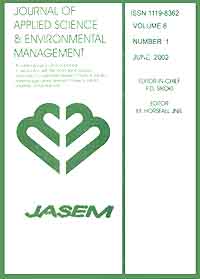
|
Journal of Applied Sciences and Environmental Management
World Bank assisted National Agricultural Research Project (NARP) - University of Port Harcourt
ISSN: 1119-8362
Vol. 12, No. 2, 2008, pp. 17-20
|
 Bioline Code: ja08022
Bioline Code: ja08022
Full paper language: English
Document type: Research Article
Document available free of charge
|
|
|
Journal of Applied Sciences and Environmental Management, Vol. 12, No. 2, 2008, pp. 17-20
| en |
Hookworm infection in Amassoma Community in the Niger Delta, Nigeria
Agi, P.I. & Awi-Waadu, G.D.B.
Abstract
Studies on hookworm infection was conducted in Amassoma community, in the Niger Delta of
Nigeria. Of the 4990 faecal samples examined by standard parasitological technique, 1740 (34.9%) samples were
found to contain eggs of hookworm. Nine hundred and seventy five infected samples (33.6%) were males and 865
(36.7%) infected samples were females. Incidence or new cases of hookworm infection occurred every month.
Highest incidence (12.2%) occurred in September and the lowest (1.8%) was in February. The high soil moisture and
temperature of the study area were probably responsible for the rapid larval development and infectivity all round the
year. Percentage new infection was highest (1.5%) in the 4-9 years old. Peak prevalence of hookworm infection
(38.5%) and peak intensity (3000 e pg) occurred in 4-9 years age group. Both prevalence and intensity declined
gradually with increase in age. The study demonstrated that the best time for intervention of hookworm transmission
is February when incidence is lowest. Also the age group for targeted mass chemotherapy is the 4-9 years old, which
had the highest prevalence, incidence and intensity of hookworm infection. This study provides baseline data on the
epidemiology of hookworm infection in the Niger Delta.
|
| |
© Copyright 2008 - Journal of Applied Sciences & Environmental Management
|
|
